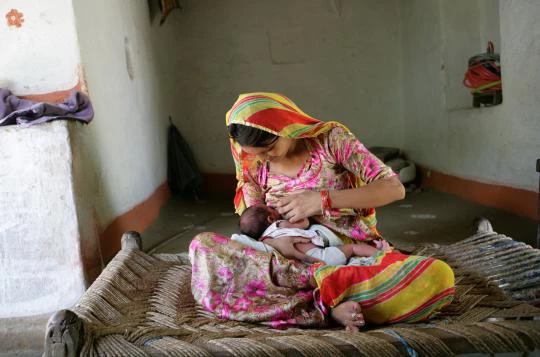
This page also available in: Español | Français | العربية
For the 22nd year, August 1-7 marks World Breastfeeding Week. This year’s theme focuses on the connection between breastfeeding and the Millennium Development Goals (MDGs), and the slogan for the week is Breastfeeding: A winning goal for life!
Underscoring the contribution of early, exclusive and continued breastfeeding to the achievement of the MDGs (particularly MDGs 4 & 5), the World Alliance for Breastfeeding Action (WABA) Chairperson, Dr. Felicity Savage, highlights the following:
“By protecting, promoting and supporting breastfeeding we can all can contribute to each of the MDGs in a substantial way. Exclusive breastfeeding and adequate appropriate complementary feeding are key interventions for improving child survival, potentially reducing deaths among children under five by about 20%. Early and exclusive breastfeeding improves newborn care and reduces neonatal mortality, which contributes to the majority of infant deaths. Breastfeeding has been shown repeatedly to be the single most effective way to prevent infant death; it plays a major role in children’s health and development, and significantly benefits the health of mothers.”
According to UNICEF and its partners, less than 50% of newborns are breastfed in the first hour of life, despite evidence supporting the critically important role that immediate skin-to-skin contact and early breastfeeding play in reduction of neonatal mortality. In addition, optimal breastfeeding of children under 2 years has the potential to prevent 800,000 child deaths every year.
For women who initiate breastfeeding in the first hour after their baby’s birth, there is a reduced risk of postpartum hemorrhage, one of the leading killers of new mothers. And for women who continue to breastfeed exclusively for six months, lack of menstruation conserves iron and contributes to birth spacing.
What can the World Bank Group do to support breastfeeding?
World Bank-supported health and nutrition projects frequently feature programs to promote, protect and support optimal breastfeeding as a critical component of infant and young child feeding efforts. We can continue to advocate with our client country colleagues for the inclusion of this important intervention in national nutrition plans; for national implementation and monitoring of the International Code of Marketing of Breastmilk Substitutes; for legislation that supports breastfeeding, such as maternity leave covering the six-month period of exclusive breastfeeding; and for the design and support of mother-friendly workplaces (e.g., breastfeeding breaks; workplace crèches; lactation rooms for breastmilk expression).
Check out the World Breastfeeding Week website for more information and ways to get involved.
Follow the World Bank Health team on Twitter: @worldbankhealth
Related


Join the Conversation